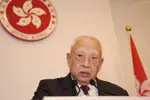Venezuelan President Hugo Chavez (R) kisses a crucifix as he speaks during a national broadcast at the Miraflores Palace, in Caracas, Venezuela, on Dec. 8, 2012.(Xinhua/AVN)
Venezuelan President Hugo Chavez is in stable but still delicate condition more than three weeks after a cancer surgery in Cuba, his son-in-law said on Wednesday.
"The medical team told us President Chavez's condition continues to be stable, but delicate," Jorge Arreaza, who is also Venezuela's minister of science and technology, said on Twitter.
On the same day, Bolivian President Evo Morales said Chavez's condition was "very worrying," after talking with his relatives.
"The situation of our brother President Chavez is very worrying. Hopefully we can see him soon, accompany him, but it is a very worrying situation," Morales told reporters in the central Bolivian city of Cochabamba.
Earlier on Sunday, Vice President Nicolas Maduro, who visited Chavez twice on a three-day trip to Cuba, said new complications from a respiratory infection had put the president in a delicate state. But he offered scant details on the complications.
He stressed later on Tuesday that Chavez is fully aware of the complexity of his condition.
The Venezuelan president, who has been fighting an undisclosed type of pelvic cancer since June 2011, underwent a fourth round of surgery in Cuba on Dec. 11. He is scheduled to be sworn in to a third six-year term on Jan. 10.
The president was "totally conscious of the complexity of his post-operative condition" and faced the illness with courage and dignity, Maduro, whom Chavez last month designated as his heir, said in a televised interview in Cuba.
"Sometimes he has had light improvements, sometimes stationary situations," Maduro said.
The ailing leader demanded that "we should keep people informed, always with the truth, no matter how hard it might be in a certain circumstance," Maduro added.
He called on Venezuelans to ignore the rumors about Chavez's health, saying they were being spread due to "the evil and the hatred of the enemies of Venezuela."
In his New Year greeting to Venezuelans delivered by Maduro, Chavez said he wished 2013 would be a year for "the consolidation of the nation and national unity."
In a phone call to Maduro on Chrismas Day, Chavez appeared well on track of recuperating from the surgery. He was able to walk about and do some exercises as part of his recovery program, and instructed on issues of Venezuela's economy, social programs and the national program, according to Maduro.
Ernesto Villegas, Venezuela's communication and information minister, said before Christmas that Chavez had shown "slight improvement" in his recovery with "a progressive tendency."
Parliament to meet to select a ruling council
The Venezuelan National Assembly will meet for its first session of the year on Jan. 5 to select a ruling council, a move that has taken on urgency in view of President Hugo Chavez's ailing health.
If Chavez is unable to take office on Jan. 10, current parliament chief Diosdado Cabello, who would be reelected to head the legislature, would temporarily assume power while elections are called.
Meanwhile, the country's conservative opposition on Wednesday demanded more concrete information on Chavez's health.
Ramon Guillermo Aveledo, secretary general of the opposition coalition Democratic Unity Board (MUD), called on the government to explain Chavez's condition "objectively and reliably."
"To make the country believe that the president is governing shows a lack of seriousness that borders on irresponsibility," Aveledo said.
"If the president elect can't attend the oath of office for health reasons, we must do what the Constitution establishes with regard to temporary absences," he added.
Cabello countered via Twitter, saying "Information for the leaders of the Venezuelan opposition: we Chavistas are very clear about what we will do, concern yourself with what you will do."
The ruling United Socialist Party of Venezuela (PSUV) has a majority in the assembly with 98 seats, while the MUD has 67 seats.
 简体中文
简体中文



